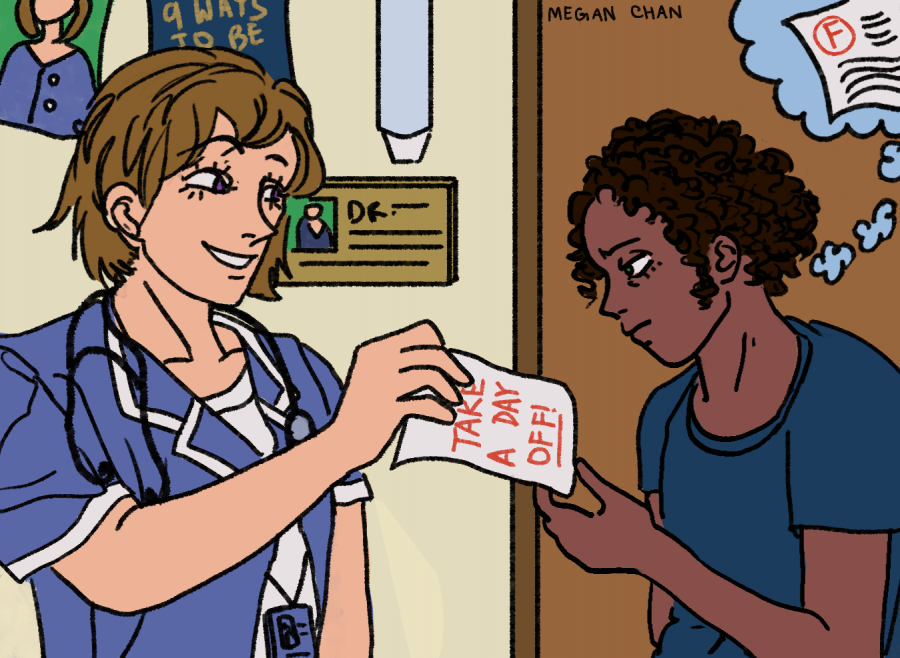Editorial: Should Sage Hill have a Nurse?
February 4, 2020
You’re in class and you have a throbbing headache. Maybe you sprained your ankle playing lacrosse. You ask your friends for Advil, but they don’t have any to give you. Now, you’re stuck without aid. What are you going to do?
Currently, Health Management Coordinator and Athletic Trainer Meaghan Beaudoin often fills the shoes of a nurse on campus. Her position at Sage Hill focuses on treatment for student-athletes. However, most members on campus can agree that she stretches well beyond her job description. Beaudoin, nicknamed “T-Meg”, also helps with many medical emergencies in numerous departments of Sage Hill.
T-Meg often steps up to the plate when a health situation arises “whether it’s a cut or splinter from something in art or a burn or exposure from one of the science classes,” Beaudoin said.
Still, that is really not in her job description, or anyone else’s at Sage for that matter. Sage’s faculty members are trained in basic emergency response.
“All of our employees are trained in basic first aid, CPR and use of AEDs,” Dean of School Life Dominic Campeau said. Additionally, “Adam Patterson and the security team also have high-level health care training including special training in bleeding control and other emergency situations.”
There is no doubt that Sage is protected in the case of a large scale emergency, but what does an individual do to receive treatment for a non-life threatening illness or accident? There are more situations on a day-to-day basis that require the aid of a legitimate nurse.
Say you have a fever, period cramps, or a bad cold. Without a licensed nurse under the supervision of a physician, you aren’t legally allowed to receive medication from any adults on campus. In other words, no ibuprofen for a migraine, injury, or fever.
There is also nowhere for students on campus to seek medical care for a common cold, flu, or other symptoms. So, T-Meg is left to pick up the slack.
“I have kids coming in knocking on my door before I open the training room in the afternoons because they don’t feel well and they don’t know where else to go. I’m super happy to see them but, because we don’t have a nurse’s office or a place where students can be monitored or observed,” Beaudoin said.
No nurse means no place for sick students to rest throughout the day. Furthermore, it means students are responsible for evaluating their symptoms and deciding whether to go home or stay at school. In theory, students who are sick are advised to not be at school in the first place.
“We ask that sick students do not come to school and do not return to school until they have been symptom-free for 24 hours,” the School Handbook says on page 20.
However, many students have a chronic fear of missing class and falling behind on our coursework.
“People come to school when they’re sick because if you skip school you fall back a ton,” senior Ezugo Ononye said.
Students might not know when to draw the line and go home. So, our solution is to “tough it out” and come to class. Without a nurse, there is no one to tell students when to go home, which further perpetuates the cycle of illness on campus. It seems that once one person gets sick, we all get sick.
The administrative justification is: Sage doesn’t need a nurse. However, we believe the need for a nurse is prevalent in our community.
So, this begs the question: Why don’t we have one already?
One possible explanation is for liability reasons. Having a nurse on campus would hold Sage more accountable, which comes with legal risks.
What we do know is that the administration takes the health of its students seriously.
“The broader area of wellness is significant to the school. We have been reviewing and making changes to our wellness programming in order to make sure that it adapts to the ever-changing needs of our students,” Campeau said.
At this point, we are currently unaware if the prospect of a school nurse is on the horizon. With the rising threat of flu, and more recently, the risk of coronavirus, it’s more important than ever students and administrators alike take a deeper look into this issue and reevaluate our health and support needs on campus.


